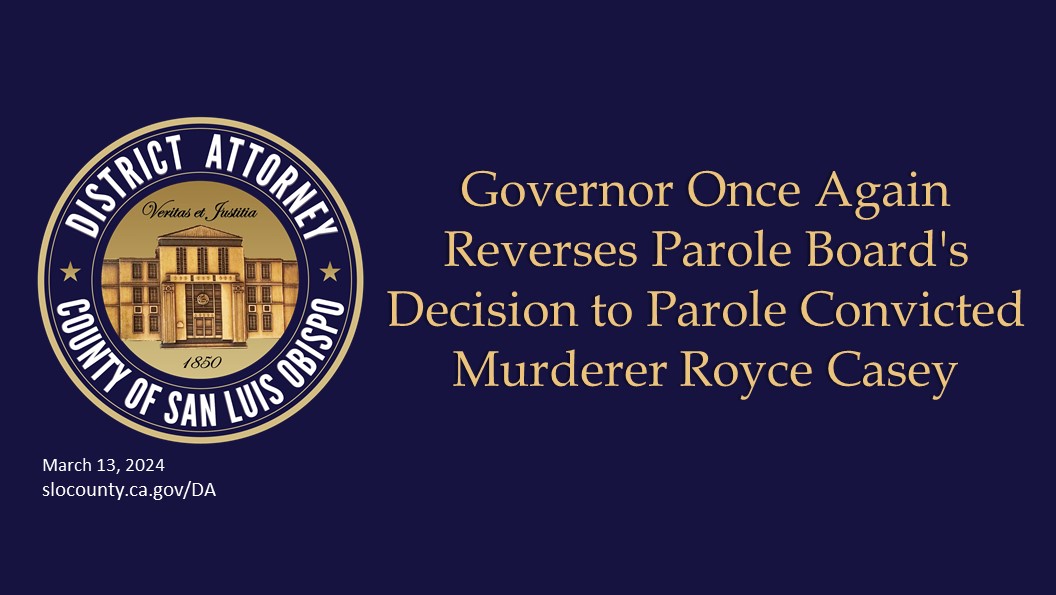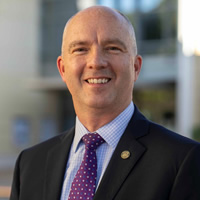
Governor Once Again Reverses Parole Board's Decision to Parole Convicted Murderer Royce Casey
Author: District Attorney
Date: 3/13/2024 4:42 PM
Three months after the District Attorney’s Office urged in writing, Governor Newsom reversed the Board of Parole Hearings’ earlier decision to release Royce Casey, one of three who were convicted and sentenced to prison for the 1995 horrific murder of Arroyo Grande High School Freshman Elyse Pahler. This is the second time the Governor has reversed the Board’s decision to parole Casey.
District Attorney Dan Dow announced today that he is very pleased with Governor Gavin Newsom's decision to once again reverse the Board of Parole Hearings' October 11, 2023 decision to grant Royce Elliott Casey parole. Casey was convicted in 1997 based on his plea to first degree murder along with his two accomplices 16-year-old Jacob Delashmutt, and 15-year-old Joseph Fiorella.
Together, they brutally murdered 15-year-old Arroyo Grande High School Freshman Elyse M. Pahler in one of the most heinous pre-meditated murders committed in the history of San Luis Obispo County. The Governor's Office sent a letter to the District Attorney’s Office on March 11th notifying of the Governor's decision.
"I am grateful for and want to thank Governor Newsom for carefully evaluating the facts and circumstances of Elyse M. Pahler's horrific murder committed by Royce Casey and his two accomplices and reviewing Royce's present day mental state. I am pleased with the Governor's conclusion that agreed with my office’s evaluation that Casey continues to pose an unreasonable danger to society if he were to be released from prison at this time,” said District Attorney Dan Dow.
On December 19, 2023, Assistant District Attorney Eric J. Dobroth wrote a letter to Governor Newsom urging him to use his authority to reverse the Board of Parole Hearings' decision to allow Casey to be released on parole. In Assistant DA Dobroth’s letter, he argued that Mr. Casey remains a threat to public safety, as he "still has not developed insight into the grave character defects that allowed him to participate in such a hideous crime” and asked that the Governor “consider established case law which holds that the presence or absence of insight is a significant factor in determining whether there is a rational nexus between the inmate’s dangerous past behavior and the threat he currently poses to public safety.”
In Governor Newsom's letter concluding that Mr. Casey poses an unreasonable danger to society at this time and should not be released, Governor Newsom explained in part:
"Mr. Casey must better understand the internal processes that led him to commit the crime and hone the skills he will need to manage them beyond the controlled environment of prison. Mr. Casey will almost certainly encounter significant stressors while navigating his reentry into the community if he is allowed to parole, particularly given the stigma and notoriety of his case. I encourage him to continue to develop his parole plans, and in particular his relapse prevention plans and the strength of his social supports, which will be critical to his success on parole. I have considered the evidence in the record that is relevant to whether Mr. Casey is currently dangerous. When considered as a whole, I find the evidence shows that he currently poses an unreasonable danger to society if released from prison at this time. Therefore, I reverse the decision to parole Mr. Casey.”
The San Luis Obispo County District Attorney's Office regularly appears with a Deputy District Attorney at the Board of Parole Hearings scheduled parole hearings to represent the interests of victims and the People of the State of California.
District Attorney Dow is committed to ensuring that the impact of the crime on the victims/survivors is not forgotten and is properly considered at every stage of the criminal proceeding, including post sentencing matters such as parole hearings.
# # #
Crime Victims' Bill of Rights
On November 4, 2008, California voters approved The California Crime Victims’ Bill of Rights which are enumerated in California Constitution article I, § 28, section (b).
The crime victims' rights are as follows:
(1) To be treated with fairness and respect for his or her privacy and dignity, and to be free from intimidation, harassment, and abuse, throughout the criminal or juvenile justice process.
(2) To be reasonably protected from the defendant and persons acting on behalf of the defendant.
(3) To have the safety of the victim and the victim’s family considered in fixing the amount of bail and release conditions for the defendant.
(4) To prevent the disclosure of confidential information or records to the defendant, the defendant’s attorney, or any other person acting on behalf of the defendant, which could be used to locate or harass the victim or the victim’s family or which disclose confidential communications made in the course of medical or counseling treatment, or which are otherwise privileged or confidential by law.
(5) To refuse an interview, deposition, or discovery request by the defendant, the defendant’s attorney, or any other person acting on behalf of the defendant, and to set reasonable conditions on the conduct of any such interview to which the victim consents.
(6) To reasonable notice of and to reasonably confer with the prosecuting agency, upon request, regarding, the arrest of the defendant if known by the prosecutor, the charges filed, the determination whether to extradite the defendant and, upon request, to be notified of and informed before any pretrial disposition of the case.
(7) To reasonable notice of all public proceedings, including delinquency proceedings, upon request, at which the defendant and the prosecutor are entitled to be present and of all parole or other post-conviction release proceedings, and to be present at all such proceedings.
(8) To be heard, upon request, at any proceeding, including any delinquency proceeding, involving a post-arrest release decision, plea, sentencing, post-conviction release decision, or any proceeding in which a right of the victim is at issue.
(9) To a speedy trial and a prompt and final conclusion of the case and any related post-judgment proceedings.
(10) To provide information to a probation department official conducting a presentence investigation concerning the impact of the offense on the victim and the victim’s family and any sentencing recommendations before the sentencing of the defendant.
(11) To receive, upon request, the pre-sentence report when available to the defendant, except for those portions made confidential by law.
(12) To be informed, upon request, of the conviction, sentence, place and time of incarceration, or other disposition of the defendant, the scheduled release date of the defendant, and the release of or the escape by the defendant from custody.
(13) To restitution.
(A) It is the unequivocal intention of the People of the State of California that all persons who suffer losses as a result of criminal activity shall have the right to seek and secure restitution from the persons convicted of the crimes causing the losses they suffer.
(B) Restitution shall be ordered from the convicted wrongdoer in every case, regardless of the sentence or disposition imposed, in which a crime victim suffers a loss.
(C) All monetary payments, monies, and property collected from any person who has been ordered to make restitution shall be first applied to pay the amounts ordered as restitution to the victim.
(14) To the prompt return of property when no longer needed as evidence.
(15) To be informed of all parole procedures, to participate in the parole process, to provide information to the parole authority to be considered before the parole of the offender, and to be notified, upon request, of the parole or other release of the offender.
(16) To have the safety of the victim, the victim’s family, and the general public considered before any parole or other post-judgment release decision is made.
(17) To be informed of the rights enumerated in paragraphs (1) through (16).
